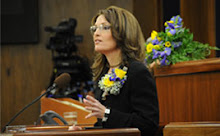Yesterday President Obama responded to my statement that Democratic health care proposals would lead to rationed care; that the sick, the elderly, and the disabled would suffer the most under such rationing; and that under such a system these “unproductive” members of society could face the prospect of government bureaucrats determining whether they deserve health care (Palin, 2009, ¶1).
The President made light of these concerns. He said: (Palin, 2009, ¶2)
“Let me just be specific about some things that I’ve been hearing lately that we just need to dispose of here. The rumor that’s been circulating a lot lately is this idea that somehow the House of Representatives voted for death panels that will basically pull the plug on grandma because we’ve decided that we don’t, it’s too expensive to let her live anymore....It turns out that I guess this arose out of a provision in one of the House bills that allowed Medicare to reimburse people for consultations about end-of-life care, setting up living wills, the availability of hospice, etc. So the intention of the members of Congress was to give people more information so that they could handle issues of end-of-life care when they’re ready on their own terms. It wasn’t forcing anybody to do anything” (Palin, 2009, ¶3)[1]
The provision that President Obama refers to is Section 1233 of HR 3200, entitled “Advance Care Planning Consultation.” [2] With all due respect, it’s misleading for the President to describe this section as an entirely voluntary provision that simply increases the information offered to Medicare recipients. The issue is the context in which that information is provided and the coercive effect these consultations will have in that context (Palin, 2009, ¶4).
Section 1233 authorizes advanced care planning consultations for senior citizens on Medicare every five years, and more often “if there is a significant change in the health condition of the individual ... or upon admission to a skilled nursing facility, a long-term care facility... or a hospice program." [3] During those consultations, practitioners must explain “the continuum of end-of-life services and supports available, including palliative care and hospice,” and the government benefits available to pay for such services. [4](Palin, 2009, ¶5)
Now put this in context. These consultations are authorized whenever a Medicare recipient’s health changes significantly or when they enter a nursing home, and they are part of a bill whose stated purpose is “to reduce the growth in health care spending.” [5] Is it any wonder that senior citizens might view such consultations as attempts to convince them to help reduce health care costs by accepting minimal end-of-life care? As Charles Lane notes in the Washington Post, Section 1233 “addresses compassionate goals in disconcerting proximity to fiscal ones.... If it’s all about alleviating suffering, emotional or physical, what’s it doing in a measure to “bend the curve” on health-care costs?” [6] (Palin, 2009, ¶6)
As Lane also points out: (Palin, 2009, ¶7)
Though not mandatory, as some on the right have claimed, the consultations envisioned in Section 1233 aren’t quite “purely voluntary,” as Rep. Sander M. Levin (D-Mich.) asserts. To me, “purely voluntary” means “not unless the patient requests one.” Section 1233, however, lets doctors initiate the chat and gives them an incentive -- money -- to do so. Indeed, that’s an incentive to insist (Palin, 2009, ¶8).
Patients may refuse without penalty, but many will bow to white-coated authority. Once they’re in the meeting, the bill does permit “formulation” of a plug-pulling order right then and there. So when Rep. Earl Blumenauer (D-Ore.) denies that Section 1233 would “place senior citizens in situations where they feel pressured to sign end-of-life directives that they would not otherwise sign,” I don’t think he’s being realistic. [7] (Palin, 2009, ¶9)
Even columnist Eugene Robinson, a self-described “true believer” who “will almost certainly support” “whatever reform package finally emerges”, agrees that “If the government says it has to control health-care costs and then offers to pay doctors to give advice about hospice care, citizens are not delusional to conclude that the goal is to reduce end-of-life spending.” [8] (Palin, 2009, ¶10)
So are these usually friendly pundits wrong? Is this all just a “rumor” to be “disposed of”, as President Obama says? Not according to Democratic New York State Senator Ruben Diaz, Chairman of the New York State Senate Aging Committee, who writes: (Palin, 2009, ¶11)
Section 1233 of House Resolution 3200 puts our senior citizens on a slippery slope and may diminish respect for the inherent dignity of each of their lives.... It is egregious to consider that any senior citizen ... should be placed in a situation where he or she would feel pressured to save the government money by dying a little sooner than he or she otherwise would, be required to be counseled about the supposed benefits of killing oneself, or be encouraged to sign any end of life directives that they would not otherwise sign. [9] (Palin, 2009, ¶12)
Of course, it’s not just this one provision that presents a problem. My original comments concerned statements made by Dr. Ezekiel Emanuel, a health policy advisor to President Obama and the brother of the President’s chief of staff. Dr. Emanuel has written that some medical services should not be guaranteed to those “who are irreversibly prevented from being or becoming participating citizens....An obvious example is not guaranteeing health services to patients with dementia.” [10] Dr. Emanuel has also advocated basing medical decisions on a system which “produces a priority curve on which individuals aged between roughly 15 and 40 years get the most chance, whereas the youngest and oldest people get chances that are attenuated.” [11] (Palin, 2009, ¶13)
President Obama can try to gloss over the effects of government authorized end-of-life consultations, but the views of one of his top health care advisors are clear enough. It’s all just more evidence that the Democratic legislative proposals will lead to health care rationing, and more evidence that the top-down plans of government bureaucrats will never result in real health care reform (Palin, 2009, ¶14).
[1] See http://blogs.abcnews.com/politicalpunch/2009/08/pres .ident-obama-addresses-sara h-palin-death-panels-wild- representations.html
[2] See http://edlabor.house.gov/documents/111/pdf/publicati ons/AAHCA-BillText-071409.
[3] See HR 3200 sec. 1233 (hhh)(1); Sec. 1233 (hhh)(3)(B)(1), above.
[4] See HR 3200 sec. 1233 (hhh)(1)(E), above.
[5] See http://edlabor.house.gov/documents/111/pdf/publicati ons/AAHCA-BillText-071409.
[6] See http://www.washingtonpost.com/wp-dyn/content/article ]./2009/08/07/AR200908070304 3.html
[7] Id.
[8] See http://www.washingtonpost.com/wp-dyn/content/article ]./2009/08/10/AR200908100245 5.html
[9] See http://www.nysenate.gov/press-release/letter-congres .sman-henry-waxman-re-secti on-1233-hr-3200
[10] See http://www.ncpa.org/pdfs/Where_Civic_Republicanism_a nd_Deliberative_Democracy_ Meet.pdf
[11] See http://www.scribd.com/doc/18280675/Principles-for-Al .location-of-Scarce-Medical -Interventions
Commentary
The observation to be made here is that Governor Palin once again, cites, references and backs up her statements with facts and evidence. She didn't just pull her thoughts out of thin air....or off a teleprompter.
Unlike Obama, she read the different variants of this bill. She knows what is in it.
Her use of the term "death panels" and thesis that this plan is evil is well-researched and based on documented evidence presented by numerous sources on both sides of the issue.
Those who continue to doubt the veracity of her statements on health care simply have not done any research on the subject matter.
References
Palin, S.L.H. (2009, August 12). "Concerning the Death Panels." FaceBook, Sarah Palin. Retrieved August 13, 2009 from: http://www.facebook.com/notes.php?id=24718773587&__a=1

































No comments:
Post a Comment